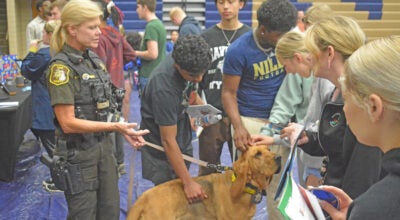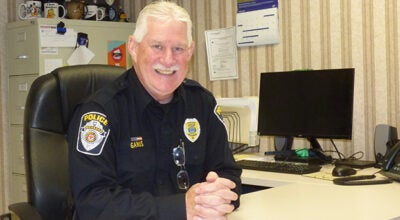Former Dowagiac resident aids oil spill cleanup
Published 5:11 pm Monday, July 5, 2010

A shovel scoops oil from the water. (Photo submitted)
By JOHN EBY
Niles Daily Star
Former Dowagiac resident Shannon (Higginbotham) Pokrandt has lived in Pensacola, Fla. since the summer of 1997, after she got out of the Navy.
Pokrandt, who attended school with the Dowagiac Union High School Class of 1983, moved to North Carolina at 16 after her sophomore year, but usually makes it to her hometown each summer.
This summer will be no exception. She and fiance Tony Garritano plan to visit in August.
But right now she’s busy making $200 a day as a deckhand on a 23-foot boat she shares with a captain and two “haz whoppers” trying to skim a thick oil slick washing up on the beaches half a block from her home in the Florida panhandle from crude gushing into the Gulf of Mexico for 74 days.
Pensacola is a city of 300,000. She lives just 10 miles from Alabama.
“I go out there and cry because this is why I moved here,” Pokrandt said in a phone interview Thursday afternoon while on standby from stormy weather.
“You love where you live and you want to take care of it, ” she said. “The oyster beds are shut down, shrimping, all that great seafood gone. We love seafood and went down to the fisheries (and stocked up her freezer) before it ran out.”
Besides seafood restaurants, there is the tourism toll in general.
A friend who rents for a resort reported 30,000 cancellations into the future.
Pokrandt points out that even residents of Louisiana and Mississippi come for more “pristine” beaches because Florida has forbidden drilling.
“It’s not good,” she said of the thick toxic tar balls she calls “globs” fouling her environment.
“It’s upsetting, but you’ve got to deal with it,” Pokrandt said. “One boat captain from Mississippi shot himself. He might have had problems before, but his wife blamed the stress of this job. I don’t feel any stress. I love myself too much. I just get upset when I see it.”
Pokrandt, who as a deckhand does “go-for” work, said she lives about four miles from the marina she’s been working out of for the past two weeks.
BP hired a company, which in turn hires boats and personnel for the clean-up, including “haz whoppers,” who wear haz-mat suits, two layers of gloves and rubber boots.
“I was specifically hired by my boat captain,” Pokrandt said. “I don’t work for anyone else, so I can take pictures and run my mouth. I don’t work for” BP.
The scene Pokrandt describes sounds like a Wild West gold rush, except these prospectors pans for jobs of indefinite duration to offset their lost livelihoods.
Volunteers cannot touch oil.
She attended a half-day class to be a deckhand. To be a haz-whopper in a suit, actually picking up oil, requires a three-day class.
The hot suits leave wearers so drenched, Pokrandt said it is worn for 15 minutes, followed by 45 minutes rest, causing casual observers to think everyone is just sitting around.
In photos she e-mailed, shovels scoop goop like mucking out a barn stall.
She also described equipment thrown in the water and dragged behind the boat that they call a “sausage” as working like a huge tampon to which oil clings.
Captured oil is bagged, duct-taped and bagged again, the placed in designated Dumpsters.
“We don’t know where it goes from there,” she said.
When it “finally hit shore,” the local news was still broadcasting that it was safe to go to the beach.
Pokrandt retired from the post office in January and was working cleaning a bar for a couple of guys who owned three boats idled by the lack of fishing and diving opportunities.
“Sure, I’ll get trained,” Pokrandt said.
Haz whoppers make $37 an hour, overtime after 40 hours. Some log 72-hour weeks, she said.
With a fleet of 5,000 boats in the water, authorities are not letting more get qualified, but there is a need for 10,000 to 15,000, in her estimation.
Pokrandt is more experienced coping with hurricanes.
In September 2004, a year before Katrina blasted New Orleans, “My house got taken out by Hurricane Ivan,” she said. “My son said, ‘God makes hurricanes to bring people together.'”






